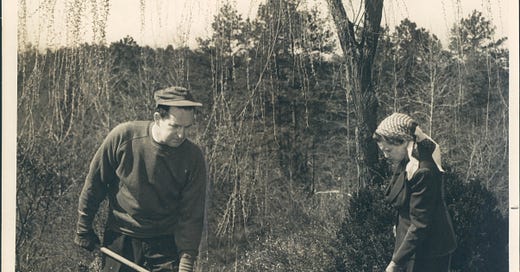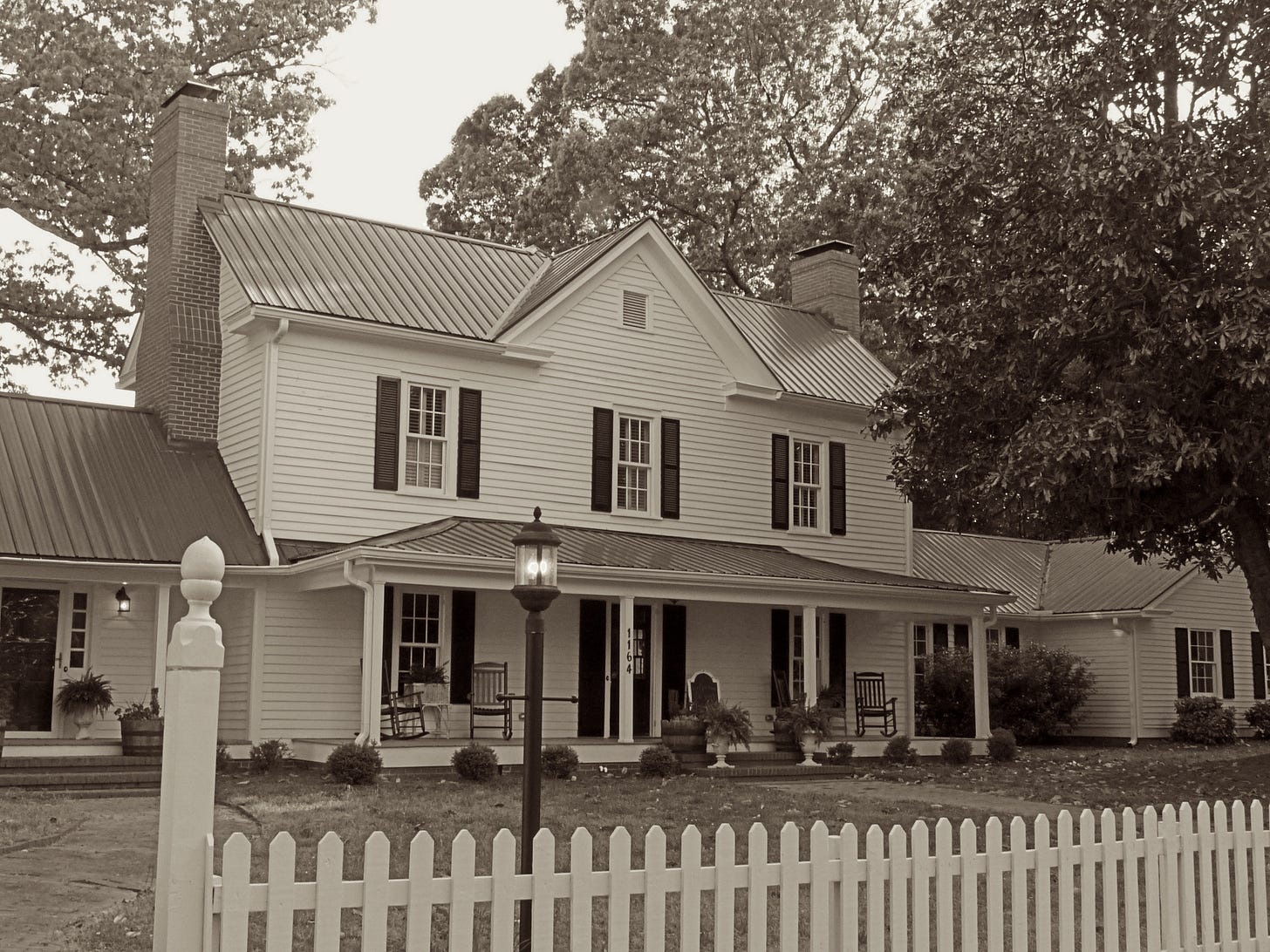By the winter of 1967, Paul Green and his wife, Elizabeth, were settled into their new home in the country south of Chapel Hill. Previously they had been living in the Greenwood neighborhood that Paul had developed, raising their four children there. The house, built as an inn near the end of the 19th century, was named Windy Oaks. The property needed landscaping and clearing for gardens, a task they undertook with relish, though they might have needed a bit more help with the heavy lifting than in earlier years.
In those days North Carolina was enjoying an era of true progress. By 1966, Governor Dan K. Moore had succeeded Terry Sanford, continuing the significant improvements in public education and arts funding, and raising awareness of racial inequities. William C. Friday was leading the University of North Carolina and was squarely in the middle of his campaign against the Speaker Ban legislation. College students had organized marches in dozens of cities to protest the war in Vietnam. The peaceful demonstrations on Franklin Street in Chapel were growing every week.
That winter Paul Green was 73 years old. His symphonic drama THE LOST COLONY was celebrating its 30th season. Throughout the early 1960s, Green had worked with countless communities around the southeast, writing and developing their local historic outdoor dramas. He was enjoying his retirement from teaching. He was still writing, working as an advocate for literature and for music through the North Carolina Symphony, and he was involved in creating a new organization to oppose the death penalty.
His friends included John Ehle, Kay and Georgia Kyser, and Bill and Ida Friday. In these diary entries, we have culled notes that express Green’s passion for the natural world. And, of course, the weather—a subject of perpetual interest to gardeners.
Wednesday, January 25
For the last few days I have been working on my Carolina word book, just to fill in between jobs, as it were. The weather for nearly a week—since a two-inch snow—has been warm as spring, up to 75 degrees during the day. Elizabeth has had an orgy of gardening.
Saturday, the 21st, we had a meeting in Raleigh to talk about the death penalty. A fine gathering of some 60 or 65 people from different parts of the state—ministers, lawyers, judges, housewives, teachers, legislators (a few) and business men. Luncheon at the motel across from the Pullen Baptist Church…
Well, Chapel Hill keeps on its bulldozing and progress way. Now Aunt Fanny McDade’s old home on Cameron Avenue near the UNC laundry has been torn down to make way for something. How many times have I sat on Aunt Fanny’s little heater and heard her talk of the old days? She lived to be 104. That was enough, and so I guess it’s time now for something else to have its day where she had hers so long and so happily.
Yesterday I sold my cabin and the land around it leading out to Old Lystra Road to Dr. Floy Oldham, Jr. Elizabeth has been lonesome, patient though, spending her whole day here at Windy Oaks while I stayed working in the cabin. So Arthur and I moved all my stuff back up the hill, and tonight I am in my south upstairs office snug enough and comfortable.
John Ehle’s book [The Road] is in from Harper’s, and I notice he has improved the opening, doing a different one from the one I suggested. He always does better than I say. A real writer.
Thursday, Feb. 2
Elizabeth and I went to Pipsissewa Hills to see if we could find an old road leading a better way to our land. We were fortunate and found one, which, with a bit of trimming of young growth, will be okay for us to get in and out on. Found the total wreck of an old house, also an acre of periwinkle there.
“There must be an old graveyard around here,” said Elizabeth. Soon we found one and we found more than that—a clump of marvelous English boxwood, terribly tormented with honeysuckle and briars and poison ivy.
Later we walked on a portion of our land we had never walked and were pleased to see the fine stand of timber growing.
“This is a good investment for our children,” I said.
“Yes, and maybe for us, too,” said Elizabeth, as her eyes searched the ground ahead for her partridge berries.
Home through the rain. Called Mr. Hancock in Siler City and asked him if it was okay to use the old timber road across his land to get to ours. He said it was. I felt relieved. I also asked him if he would sell the boxwood. He said he might and for me to make him an offer…I’ll write him in a few days.
Worked very late on my word book. Little Sleep. Feel better, I think, at 175 pounds. Need to get off five more. Maybe if I join the Peace fast I will lose that and more.
Wind blowing strong during the night. Cold weather coming.
Blooming around Chapel Hill at this time:
pansies
jonquils (a few)
violets (special kind)
hepaticas (in some of the coves)
sweet breath of spring
pyrus japonica
winter jasmine (a big clump of it with its yellow flowers at the entrance to Dr. Hedgepeth’s place on Old Lystra Road. I noticed them this afternoon driving home from the Library)
But fierce hard winter cold is ahead, and repentance is to be.
Friday, Feb 3
Met for several hours with Ida Friday and Charlie Shaffer on N.C. Symphony business. Ida’s a good girl.
Saturday, Feb. 4
Day bright and sunny. In the afternoon, Elizabeth and I went back to P. Hills. Dug ferns to bring home. Planted them below the garden and in our wildflower place. At night on word book.
Monday, February 6
During the night the wind rose, the rain came. I lay snug in my bed listening, happy and warm in listening. And I felt no need of my mother’s hand nor a heavenly father concept of comfort to soothe me. The wind and the rain did that. And on and on through the night I rode the turning world toward the east, feeling myself a part of the mystery of all creation and the majesty of the starry universe, a part, a breathing vital creature, one with it all, and I felt easy in my soul, and with no sign of the cross or genuflected limb I blessed all things that are, all creatures, birds, beasts, fishes in the deep, flowers, trees, and ever my brother man in every land and clime, and there my darker friend a few hundred yards over the hill, whether he lay locked in love and dissolute, drunk and uncaring of any soft arms—my blessing and affection, too. And finally I slept.
Friday, April 21
In afternoon Elizabeth and I went to walk in Deep River land. Found gobs of trailing arbutus, wild azaleas, blood root, hepaticas, dogtooth violets, etc. etc. Dug a lot of things up and toted them a mile to our car. “Let’s buy this land,” said Elizabeth.
“And maybe we can call it Azalea Hills.”
“Yes,” she said.
I found a holly tree with 22 stalks or sapling bodies. An amazing thing to look at. Weather warm.
Thursday, April 27
A gale blew all day, tattered green leaves from the maples and oak and leafy twinge of the same scattered about the lawn, down in the garden and the lily pool. Some of the tin on the barn-cabin south of the house pried loose and set hanging. Had to climb a ladder and nail it back. The morning taken up with business matters… In spite of my back I plowed the garden furiously with the wheel hoe, having to make or break.
In the afternoon sat and watched the nervous and flit-fluttering birds feeding from the spread grain on the brick walk toward the pool. They and the squirrels devour about three quarts of cracked corn, wheat and sunflower seed daily, but they never learn to say thanks, continuing always to be wild and skittish. Maybe they know with their conscious minds that I am their friend and won’t hurt them, but they cannot control their reflex action that sends them flying when I appear. However, if I move about very, very slowly, sort of inch along, I can get quite close to them before they take flight. This afternoon they started feeding in the following sequence with much coming and going, of course:
2 cardinals came first, then
1 indigo bunting
1 thrasher
2 sparrows
1 dove
(2 squirrels)
2 cardinals
2 doves
1 cardinal
2 doves
1 cardinal
1 dove
3 sparrows
2 towhees
(The snowbirds are all gone now. Usually they are most populous at the feeding place)
1 dove
2 cardinals
1 sparrow
3 sparrows (never any English sparrows)
1 dove
(Elizabeth appeared at the edge of the garden and they all fled. She went on down the hill and soon the greedy-guts started coming back, the still-blowing gale ruffling their feathers.)
2 cardinals arrived first, then
1 sparrow
2 brown thrashers
2 towhees
1 sparrow
1 dove
3 doves
4 cardinals
(3 squirrels)
1 cardinal
2 sparrows
and so on. I had to go to work…
At noon today I noticed a swarm of cedar waxwings in our holly trees eating away at the berries. Glad. Last year we had hundreds of robins feasting. This year only a few scattered ones. So I was glad to see the waxwings. And how busily, joyfully they would leave the holly trees now and then and swoop down to the bird fountain and drink and drink and jostle and playfully compete for the best drinking places. A heart full of blessings on them all and their living joy and vitality!
Saturday, April 29
Bought a tractor from Andrews and Riggsbee. In afternoon Elizabeth and I went to land on Deep River and dug dogtooth violets, coral honeysuckle, narcissus bulbs, foam flowers, hepaticas, and meadow lilies—brought them home and planted them down by the garden.
Found a little colony of Tree of Heaven saplings growing in woods by the spring path. Will clear around them so they can get some sunlight.
At night worked on word book.
Weather outlook good.







As the current owner of Windy Oaks, I find many things here unchanged since these entries. I would love ANY information about the early origins of the house, especially regarding it being built as an inn.